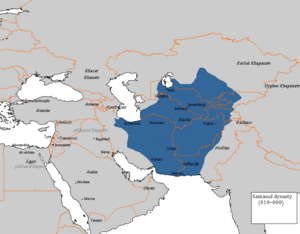Samanid dynasty facts for kids
The Samanid dynasty (Persian: سامانیان Sāmāniyān), also known as the Samanid Empire, was a powerful kingdom that existed from 819 to 999. It was founded by Saman Khuda. This empire was located in Central Asia and a region called Greater Iran. The Samanids were the first Persian empire to rise in this area after the older Sassanid Empire fell. This happened after the Arab conquest.
Contents
What Was the Samanid Dynasty?
The Samanid dynasty was a kingdom ruled by a family called the Samanids. They were a Tajik group. Their empire was very important in its time. It helped shape the history of Central Asia and Greater Iran.
Who Started the Samanid Empire?
The empire is named after its founder, Saman Khuda. He was born into a noble family that followed Zoroastrianism. This was an ancient religion. Later, Saman Khuda became a follower of Sunni Islam. His conversion was a big moment for his family and future kingdom.
Where Did the Samanids Rule?
The Samanid Empire covered a large area. This included much of what we now call Central Asia. It also included parts of Greater Iran. This region stretches across several modern countries. Their rule helped bring back Persian culture and language.
Why Were the Samanids Important?
The Samanids were very important for several reasons. They were the first major Persian kingdom to appear after the Arab conquest. This conquest had ended the Sassanid Persian Empire. The Samanids helped to revive Persian culture and language. They also supported art and science. Their time was a period of great learning and development in the region.
Images for kids
-
Picture of the Samanid Mausoleum, the burial site of Ismail Samani.
-
Iran in the mid-10th century.
-
The Sasanian king Khosrow II and his courtiers in a garden, page from a manuscript of the Shahnameh, late 15th-early 16th century. Brooklyn Museum.
-
Bowl with Arabic inscription "Planning before work protects you from regret; prosperity and peace", 10th century CE, Iran.
See also
 In Spanish: Samánidas para niños
In Spanish: Samánidas para niños
 | DeHart Hubbard |
 | Wilma Rudolph |
 | Jesse Owens |
 | Jackie Joyner-Kersee |
 | Major Taylor |










